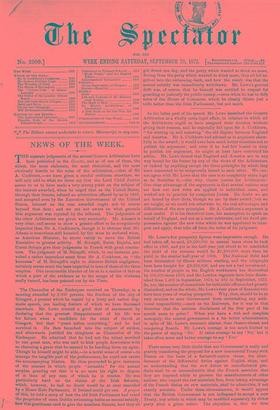The Chancellor of the Exchequer received on Thursday, in a
meeting attended by 2,000 persons, the freedom of the city of -Glasgow, a present which he repaid by a lively and rather dog- matic speech, one leading feature of which we have discussed -elsewhere. Mr. Lowe created a good deal of amusement by declaring that the greatest disappointment of his life was 'his failure when a candidate for the chair of Greek at 'Glasgow, but that "years soften everything," and he had survived it. He then launched into the subject of strikes, and afterwards justified his stinginess as Chancellor of the Exchequer. He admitted that he had not the talent ascribed to one great man, who was said to kick people downstairs with -so charming a grace that he seemed to be handing them up again. Though he himself might be able,—in a moral sense of course —to manage the tangible part of the performance, he could not create the accompanying illusion. He then proceeded to give instances -of the manner in which people " scramble " for the annual surplus, pointing out that it is no more his right to dispose of it than of any sum of which he is trustee. He was particularly hard on the claims of the Irish fisheries, which, however, he had no doubt would be at once conceded by a Home-Rule Parliament, if Ireland could get one. A propos of this, he told a story of how the old Irish Parliament had voted the proprietor of some Dublin swimming-bathe an annual subsidy, how this gentleman used to give the members dinners, how they all got drunk one day, and the party which wanted to drink no more, fleeing from the party which wanted to drink more, they all fell to- gether into the swimming-bath, and how the result was that the annual subsidy was immediately withdrawn. Mr. Lowe's general drift was, of course, that he himself was entitled to respect for guarding so jealously the public money,—even when he has to defy votes of the House of Commons which he clearly thinks just a trifle better than the Irish Parliament, but not much.


































